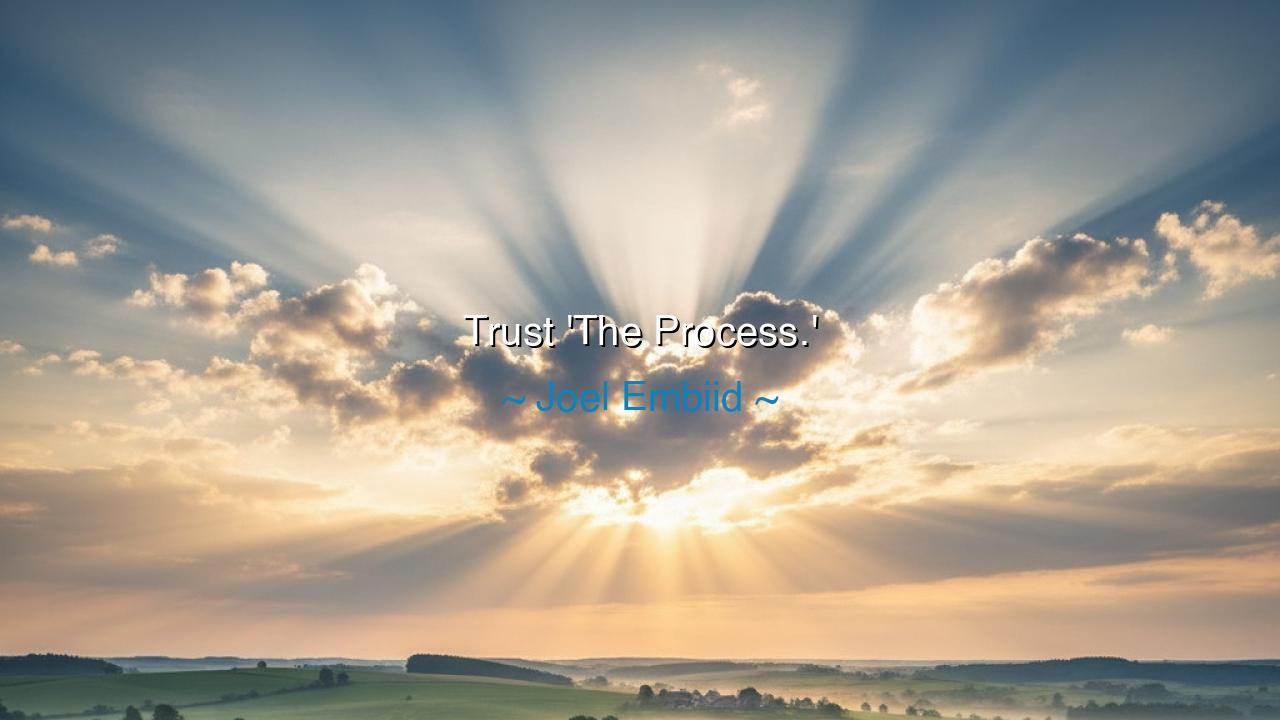
Trust 'The Process.'






Hear the words of the towering warrior of the courts, Joel Embiid, who declared with a voice that has since become legend: “Trust The Process.” This utterance, simple in sound yet mighty in meaning, was not born in triumph, but in the valley of hardship. It came from the days when Embiid’s team, the Philadelphia 76ers, endured defeat after defeat, their path uncertain, their future mocked. Yet within that struggle arose a philosophy: to endure the present pain, to place faith in the long journey, to believe that time, patience, and discipline would yield glory. Thus was born the call: Trust The Process.
For what is The Process if not the long road of growth and transformation? It is the unseen labor, the daily grind, the invisible victories won when the crowd is absent and the lights are dark. To “trust” it is to believe that though the harvest is not yet here, the seeds have been planted. It is to endure drought and storm, knowing that the roots beneath the soil are strengthening, preparing for a future bloom. Embiid’s cry is the ancient teaching of patience clothed in the language of sport.
Consider the tale of the Great Wall of China. It was not built in a year, nor even in a generation, but stone by stone, decade by decade, as laborers poured their sweat into the earth. Many who worked upon it never saw its completion, yet their efforts became part of a defense that endured for centuries. They, too, were trusting the process—believing in the worth of the unseen, the value of the unfinished. In the same way, Embiid’s call to Trust The Process reminds us that greatness is not instant, but carved through time.
The wisdom also bears warning. For many seek quick rewards, immediate victories, fleeting pleasures. They abandon the process when results are not swift, and in so doing, they abandon greatness itself. The farmer who pulls up his seeds each morning to check if they grow will never reap a harvest. The disciple who leaves his training because mastery is slow will never wield true skill. To Trust The Process is to resist this temptation, to embrace the slow rhythm of growth, even when impatience cries out.
Embiid himself embodies this teaching. Injuries kept him from the court in his early years, doubt surrounded his career, and voices declared him a failure before he could even rise. Yet he endured, believing in the unseen work of preparation. In time, he became one of the most dominant forces in basketball, proving that patience and faith in the journey bear fruit beyond expectation. His life became a living parable of his words, an example that hardship is not the end, but the beginning of greatness.
O children of tomorrow, engrave this upon your hearts: Trust The Process. Whatever your endeavor—whether in art, in study, in labor, or in love—know that the journey will be long, that setbacks will come, and that impatience will tempt you to abandon the path. Do not yield. Instead, hold firm, believe in the work, endure the trials. For all that is great and lasting is born not in haste, but in perseverance.
Thus, the cry of Joel Embiid is no mere slogan of sport. It is a teaching for all of life: greatness requires time, effort, and faith. If you would achieve something worthy, do not demand to see the fruit at once. Plant deeply, water faithfully, endure storms, and in time the harvest will come. Trust The Process, for in that trust lies the key to triumph.






67Huu Tri Nguyen 6A4 7A5
Trusting the process is a powerful reminder to stay patient and stay focused on the bigger picture. But what does it really mean to trust? Is it about believing in the outcome even when the journey gets tough, or is it about accepting that setbacks are part of the process? And how do you trust the process when those setbacks feel overwhelming? It’s easy to say trust, but the reality of doing it is often much harder.
MTnguyen thi minh tu
I appreciate the mindset of trusting the process, but is it always a healthy mindset to have? Can ‘trusting the process’ sometimes lead to complacency, where you just go through the motions without challenging yourself to improve or adapt? How do you know when the process is actually working for you, and not just keeping you stuck in a loop? Trusting the process is great, but how do we balance it with the need for change?
HBhung bach
The idea of trusting the process can be so empowering, especially when you’re working toward something big. But what happens when the process doesn’t seem to be getting you anywhere? Is it possible that we sometimes overemphasize the value of patience, when maybe it’s action that should take priority? How can we differentiate between genuine growth and the illusion of progress? What if the process isn’t actually working as well as we think?
P7Hoang Thu Phuong 7A3
I get the message here, but it’s not always easy to trust a process, especially when things aren’t moving fast. Sometimes, trusting something that’s working slowly can be disheartening. Does the phrase imply that all processes are worth following, or is it more about trusting the ones that are truly aligned with your goals? At what point do you evaluate whether the process is the right one for you?
HLNgo Hoang Long
I’ve always wondered, how do you truly know when to ‘trust the process’ and when it’s time to make changes? There’s definitely value in persistence, but is there a limit to how long you should trust something if progress feels stagnant? At what point does ‘trusting the process’ become just an excuse for staying in a situation that’s no longer working? It’s an interesting balance to figure out.